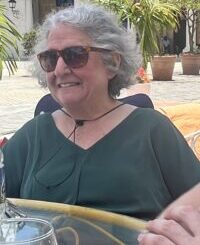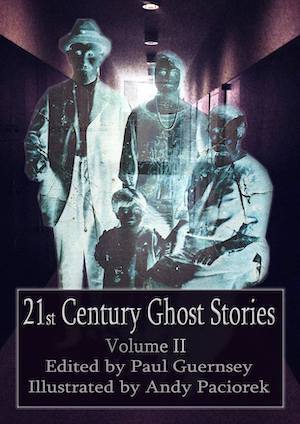HONORABLE MENTION, Summer 2024
The Screw Turn Flash Fiction Competition
BY CRISTINA BRYAN
On a cool, cloudy afternoon Mr. Bechtold and I met at the Children’s 1935 Flood Memorial in Wilkey, West Virginia. At the time I was working on my master’s thesis in Folklore, studying some of that state’s folk tales. I was specifically interested in the ghost stories that so often evolve in a community after a local tragedy. West Virginia is full of old stories about train wrecks, the murder of girls by their faithless young bridegrooms, and so on, many of these tales based in truth.
What about when a flood from a dam break wiped out 50 percent of the people in a small town, including (most memorably) all the children at a famous old boarding school? How could there not be hauntings where the school had stood? I thought there had to have been hints of this—at least mysterious sounds, a sense people have had of being watched—in later years. I simply hadn’t run across mention of any yet.
I’d started by putting a print ad in the Summers County Times-Recorder and two other papers asking for people with uncanny stories about the aftermath of the flood to get in touch. This is what had happened: the big Tugstone River Dam had burst suddenly one October morning, causing vast, almost biblical-level flooding throughout the deep valley. Wilkey was one of several towns that was practically washed away. The tragic aspect that most people tend to remember about the town is the destruction of the venerable Pierpont Academy. The town was eventually rebuilt, and on the site of the old boarding school they created a lovely park with a big memorial.
The memorial to the schoolchildren is a tall, thick slab of West Virginia granite, black in color, with 48 victims’ names inscribed in slanty letters down its front. While I think it’s handsome in a stark way, I secretly think it’s in poor taste that it doubles as a fountain. A little wall of water burps up about four inches high along the memorial’s top and flows down like a shiny sheet over the drowned people’s names.
I waited four weeks for any responses to my newspaper ad. Finally I got my only one—a message from someone called David Bechtold, who said he was a teacher in Wilkey and knew some interesting things about the flood. We arranged a meeting the following week at the monument in the town park.
Mr. Bechtold was already there when I arrived. We sat on wooden benches facing the black monolith and its roll call of the drowned.
Mr. Bechtold was probably in his mid-thirties. He had thinning reddish hair and a boyish round face. “So you’re interested in stories about the folks who died in our flood?” he asked, after we’d gotten introductions out of the way.
“Yes, and I’m grateful you’ve agreed to help me a little.”
“If I can.”
It was chilly, and I decided that in a few minutes I’d suggest we repair to the coffee shop across the street from the park.
“You already know it was the huge Tug Fork River Dam that broke,” he said. “Around nine o’clock in the morning. Turns out a section midway down the western edge had been eroding for a while. People thought later on that the dam inspectors were incompetent, or, more likely, they’d been told to hold off fixing anything on the dam for now. Repairs were expensive, and 1935 was a bad year budget-wise. The state’s experts were sure it had a few years more of soundness. Anyway repairs were left till too late.”
“And what about any local ghosts, afterwards?” I asked, wanting to hurry this along.
It was as though he hadn’t heard my question. “You see, the water came like a gigantic tidal wave down the valley,” he said. “It tore miles of forest down. By the time it got to the school the water was loaded with tons of timber and rocks.”
“I can picture that.”
“And people forget it wasn’t just the children who drowned,” Mr. Bechtold went on. “All eight teachers and the two housekeepers died that day too, plus one delivery man—though their names aren’t on a monument.”
“So the children and these grown-ups—have you heard talk of any ghosts?”
“Oh, for sure.”
“Have you seen or heard anything?”
“Of course. A lot of folks in Wilkey have. Dozens of them, I’d guess, though they might not want to talk about it.”
He fell silent. I waited.
“Mr. Bechtold?”
“But the very strangest thing to me,” he said finally, “is that in spite of the noise of all that destruction no one really heard the flood coming till it was half a mile away. It came that fast. Nothing we could have done about it, of course.”
“Mr. Bechtold . . .”
“The flood came that fast!” he said. “None of us at the school that day—not one of us—even heard it coming.”
 Cristina Bryan has been a professional editor for fiction, nonfiction, and memoir, books as well as short stories and articles, for many years. She lives in Durham, North Carolina..
Cristina Bryan has been a professional editor for fiction, nonfiction, and memoir, books as well as short stories and articles, for many years. She lives in Durham, North Carolina..

